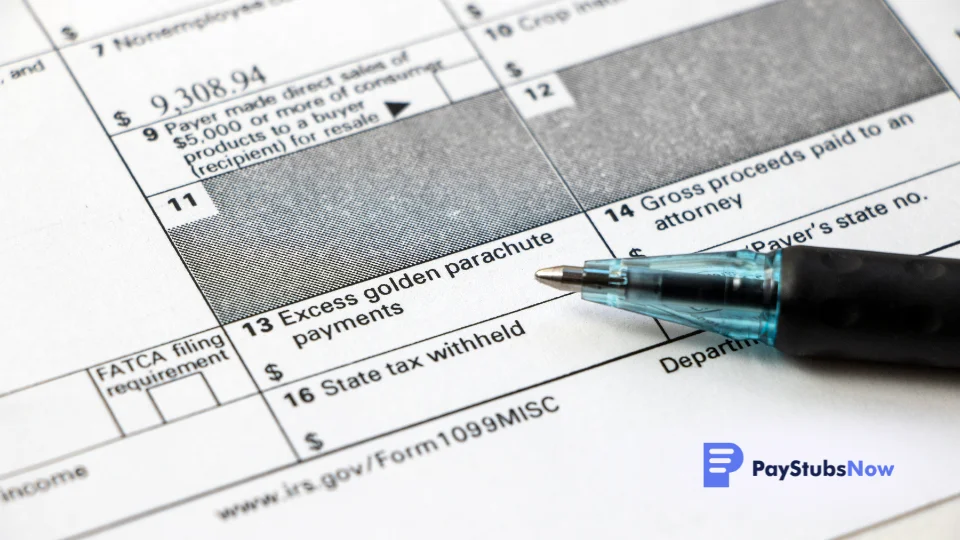What Is the Penalty for Not Issuing a 1099? How To Avoid Fines
Have you ever wondered what happens if you fail to issue those pesky 1099 forms for your contractors? Many business owners are unsure of the IRS requirements and the legal repercussions of failing to do so on time.
In this article, we'll break down the penalties for not issuing 1099s and share some practical tips to help you sidestep the fines like a pro.
Whether you're just learning who needs to file these forms or looking for strategies to keep immaculate records, we’ve got everything you need to ensure your business stays on the straight and narrow.
Main Takeaways of Form W-2 and Deadlines:
- Failing to issue 1099 forms can lead to significant penalties and legal repercussions for businesses.
- Understanding the requirements for issuing 1099s is crucial to staying compliant and avoiding fines.
- Proactive measures like collecting W-9 forms and maintaining accurate records can simplify the 1099 process.
- Regular consultations with tax professionals and staying informed on updates and deadlines are essential for effective 1099 management.
- Utilizing reliable document generation services, such as Paystubsnow, can help ensure compliance and reduce the risk of penalties.
The Importance of Form 1099
Form 1099 is vital for reporting various types of income to the IRS, which helps ensure that everyone pays their fair share of taxes. Without it, businesses can face hefty fines and other legal consequences. Issuing Form 1099 is crucial for several reasons, including:
- Compliance: Filing Form 1099 ensures your business complies with IRS regulations, thus avoiding costly penalties.
- Tracking Income: This helps track income for individuals and businesses, making it easier for them to report earnings accurately.
- Avoiding Audits: Proper Form 1099 issuance minimizes the risk of IRS audits, providing peace of mind to your business.
- Supporting Contractors: Provides non-employees with necessary documentation to file taxes, fostering a reliable working relationship.
- Encouraging Transparency: Promotes financial transparency and accuracy in business operations, which is essential for investors and stakeholders.
- Mitigating Legal Risks: Reduces potential legal repercussions from failure to report payments correctly.
Who Must Issue 1099s?

Any business paying $600 or more to a non-employee in a calendar year must issue a Form 1099-NEC, including payments to independent contractors, freelancers, and other service providers. Property managers paying rent, healthcare providers making medical payments, and royalty payments are some scenarios that demand the issuance of Form 1099-MISC.
Here are some key considerations:
- Ensure all payments to non-employees are tracked consistently throughout the year.
- Request W-9 forms from all non-employee service providers upon engagement.
- Maintain detailed records of all transactions to determine who should receive a 1099 accurately.
- Verify the accuracy of provided TINs (Tax Identification Numbers) to avoid potential errors.
- Review the IRS guidelines annually to stay updated on any changes regarding Form 1099 requirements.
By identifying who needs Form 1099 early, you can avoid last-minute scrambling and ensure proper compliance. This proactive approach minimizes the risk of penalties and keeps your business in good standing with the IRS.
Key Forms and Required Information

When issuing 1099 forms, you must know which forms and specific information will be required. Different scenarios necessitate different forms, so knowing which one applies is crucial.
Here are the forms that are commonly required:
- Form 1099-MISC: Used primarily for reporting miscellaneous income such as rents, royalties, and awards.
- Form 1099-NEC: Specifically for reporting non-employee compensation of $600 or more.
- Form 1099-DIV: Reports dividends and distributions from investments.
- Form 1099-INT: For interest income from banks and financial institutions.
- Form 1099-B: Reports proceeds from broker and barter exchange transactions.
Make sure that you have the following information ready for each form:
- Payee’s full name and address
- Taxpayer Identification Number (TIN) or Social Security Number (SSN)
- Total amount paid during the tax year
- Payment type (categorized correctly in the appropriate box on the form)
Getting the form and details right can save you time and money and help you stay compliant to avoid potential penalties.
Penalties for Not Providing a Correct Payee Statement

Understanding that the IRS is serious about 1099 form compliance is crucial. Failing to provide a correct payee statement can lead to a plethora of fines and penalties, some of which can be severely detrimental to the financial health of your business.
Let's look at different scenarios where penalties apply:
- Failure to File and Late Filing: The penalties can be significant if you fail to submit or file, electronically or conventionally, your 1099 forms late. These fines generally range from $30 to $100 per form, with a maximum penalty of up to $1.5 million annually for small businesses. The exact amount depends on how late the forms are submitted.
- Incorrect Information: Tax authorities treat incorrect filings seriously. Providing incorrect information on a 1099 form can easily result in fines. It’s in your best interest to file correctly every time. If you unintentionally submit inaccurate forms, you could face a penalty ranging between $50 to $280 per form, depending on the severity and timing of your correction.
- Intentional Disregard: Penalties skyrocket when filing requirements are intentionally ignored. In these cases, businesses can face a minimum penalty of $630 per form or 10% of the income that should have been reported. The IRS takes a no-nonsense approach and fines can quickly add up to a substantial amount.
These penalties may seem minor but can accumulate quickly and severely impact your bottom line. Not only do they strain business finances, but they also consume time and resources that could be better spent elsewhere in your business.
How To Avoid Penalties

Avoiding federal income tax penalties might sound daunting, but it's entirely doable with the right approach. We'll walk you through the top strategies to ensure you're issuing 1099s accurately and on time.
From understanding requirements to leveraging top-notch tools and seeking expert advice, we've got you covered to keep your business compliant and penalty-free.
Understand the Requirements
Knowing the requirements for issuing 1099 forms is the first step in avoiding penalties. Here's how you can ensure you’re on the right track:
- Familiarize Yourself With 1099 Forms: Find out about the different types of 1099 forms, such as 1099-NEC and 1099-MISC, to ensure you're using the correct one.
- Know the Income Thresholds: Learn about different income limits that trigger the necessity to issue a 1099 form. For instance, payments to contractors totaling $600 or more generally require a 1099-NEC.
- Familiarize Yourself With Deadlines: Ensure you understand the deadlines for issuing the forms to recipients and filing them with the IRS.
- Regularly Review IRS Guidelines: Stay informed about the changes to 1099 filing requirements.
- Consult IRS Publications: Consult the IRS website or a tax advisor to clarify any ambiguities you encounter regarding 1099 issuance.
By keeping these requirements top of mind, you’ll significantly reduce the likelihood of incurring penalties. Proactively understanding and adhering to these rules is essential for seamless tax compliance.
Collect W-9 Forms Proactively
Proactively collecting W-9 forms is crucial for complying with IRS regulations and avoiding penalties. Here are some actionable tips to help you implement this effectively:
- Request at Onboarding: To streamline this practice, ensure that you ask for a completed W-9 form from any contractors or vendors during the onboarding process.
- Set Reminders: Utilize calendar alerts or project management tools to remind yourself to collect W-9 forms before initiating any payments.
- Use Digital Forms: Opt for digital forms and e-signatures to make it easier and quicker for freelancers and contractors to provide their information.
- Follow Up Regularly: Have a follow-up system for pending W-9 forms to ensure timely and complete documentation.
- Centralized Storage: Store all W-9 forms securely in a centralized digital location to ensure easy access during tax season.
Taking these proactive steps can significantly reduce the hassle of last-minute scrambles for information and ensure you remain prepared well ahead of tax reporting deadlines, which will keep your business compliant and build trust with the independent contractors and vendors you work with.
Maintain Accurate Records
Keeping your records accurate is essential to ensure compliance and avoid penalties when issuing 1099 forms. Maintaining precise and organized records lets you easily track payments and avoid discrepancies that might lead to significant fines.
Here are some actionable tips to help you out:
- Use a Dedicated System: Implement reliable accounting software to categorize and track all payments made to independent contractors.
- Regular Updates: Schedule periodic checks to update and verify financial records, ensuring you log all transactions accurately.
- Detailed Documentation: Keep copies of all invoices, receipts, and contracts related to payments to non-employees.
- Backup Records: To prevent data loss, store digital copies of all relevant documents in a secure, backed-up storage system.
- Consistent Audit Practice: Conduct regular internal audits to ensure that all financial records match the payments made and 1099 forms issued.
- Collaboration: Work closely with your accounting department or bookkeeper to ensure everyone is on the same page regarding record maintenance.
Accurate record-keeping is not just a legal obligation but a best practice for businesses. Staying organized safeguards your company from unnecessary penalties and streamlines your financial operations.
Use Reliable Accounting Software
Investing in reliable accounting software can be a game-changer in maintaining compliance with IRS regulations, particularly when issuing 1099 forms. Here’s how you can step up your compliance game with trustworthy accounting tools:
- Automate Data Entry: Automating financial data input can reduce human error and ensure more accurate 1099 forms.
- Real-Time Tracking: Monitor all payments and transactions in real-time, so you always know who needs a 1099 form and when.
- Integrate With Payroll: Seamlessly connect your accounting software with your payroll system to ensure all financial data is consistent and current.
- Generate Reports: Create detailed reports easily, which can help you identify any discrepancies before they become an issue.
- Simple E-Filing: Many accounting software solutions offer direct e-filing options with the IRS, simplifying the submission process.
Reliable accounting software can take the stress of issuing 1099 forms by automating and streamlining the process. By choosing the right tools, you can focus on what truly matters—growing your business.
Stay Informed on Updates and Deadlines
Tax laws and regulations can change, sometimes with little notice. Staying informed about updates and deadlines for issuing 1099 forms is crucial to avoid unnecessary fines. Regularly check the IRS website for the latest information and consider subscribing to a tax newsletter.
Having a reliable system to track every critical due date ensures you can meet important deadlines. Here's how you can stay on top of it:
- Sign Up for Email Alerts: Configure alerts from the IRS to get notifications about any updates directly to your inbox.
- Use a Tax Calendar Tool: Maintain a calendar either online or using a physical planner to mark all tax-related deadlines.
- Attend Webinars and Workshops: Participate in webinars and workshops on tax compliance to stay updated on new regulations and deadlines.
You must pay attention to and follow essential tax updates and deadlines in order to stay informed. By staying proactive, you'll ensure your business remains compliant and avoids costly penalties.
Consult With a Tax Professional
Although doing your business taxes can be empowering, consulting with a tax professional can make a significant difference in ensuring compliance and accuracy. A tax pro or accountant can help you navigate the complexities of tax regulations and prevent costly mistakes.
Here are some practical ways you can benefit from their expertise:
- Personalized Advice: Tailored guidance specific to your business needs and structure.
- Up-to-Date Knowledge: Expertise in current tax laws, updates, and deadlines.
- Error Reduction: Professional review to minimize errors and subsequent penalties.
- Timely Filing: Ensure that your forms are filed correctly and on time.
- Audit Support: Assistance in case you face an IRS audit or need to provide additional documentation.
By leveraging a tax professional's skills, you can focus on running your business smoothly while they handle the complexities. This partnership is an invaluable investment to help you avoid penalties and ensure financial health in the short and long term for your business.
Simplify Compliance With Paystubsnow
Staying compliant with tax regulations might seem daunting, but it’s much more manageable with the right tools and proactive measures.
By understanding the requirements, keeping accurate records, and utilizing reliable services, you can avoid costly penalties for failing to issue 1099 forms. Remember, preparation and diligence go a long way in ensuring your business runs smoothly.
Paystubsnow offers precise and compliant document generation services, making it easier than ever to manage and create 1099 forms. Whether you need to generate pay stubs, invoices, or 1099s, the platform has you covered with user-friendly tools and exceptional customer support.
So why wait? Generate 1099 forms with Paystubsnow and keep your business fully compliant!

